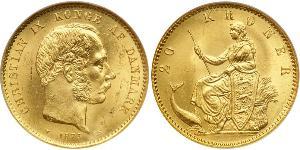1/2 Dollar (Verkauft für $25.0)
1950-S, USA. Silver "Booker T. Washington" Half Dollar (50 Cents) Coin. AU-UNC!
Mint Year: 1950 Reference: KM-198. Mint Place: San Francisco (S) Condition: Numerous tiny contact-marks, otherwise a nice lustre AU-UNC! Denomination: Half Dollar Material: Silver (.900) Weight: 12.56gm Diameter: 31mm
Obverse: Bust of Booker T. Washington 3/4 right. Date (1950) and denomination to left, motto (EPLURIBUS UNUM) to right. Legend: UNITED STATES OF AMERICA - BOOKER T. WASHINGTON
Reverse: Hall of Fame and slave cabin split by legend (FROM SLAVE CABIN TO HALL OF FAME). Mint initial (S) below. Comment: Motto (IN GOD WE TRUST) in left fieldand location of the birth memorial (FRANKLIN COUNTY VA) in right field. Legend: BOOKER T. WAHSINGROM BIRTHPLACE MEMORIAL * LIBERTY *
E pluribus unum, Latin for "Out of many, one", is a motto requested by Pierre Eugene du Simitiere (originally Pierre-Eugène Ducimetière) and found in 1776 on the Seal of the United States, along with Annuit cœptis and Novus ordo seclorum, and adopted by an Act of Congress in 1782. The phrase originally came from Moretum, a poem attributed to Virgil but with the actual author unknown. In the poem text, color est e pluribus unus describes the blending of colors into one.
Booker Taliaferro Washington (April 5, 1856 – November 14, 1915) was an American educator, author, orator and political leader. He was the dominant figure in the African American community in the United States from 1890 to 1915. He was representative of the last generation of black leaders born in slavery and spoke for those blacks who had remained in modus vivendi with racist white Southerners in the exploitative racist atmosphere of the post – reconstruction South. Washington was able throughout the final 25 years of his life to maintain his standing as the major black leader because of the sponsorship by powerful whites, substantial support within the black community, his ability to raise educational funds from both groups and his accommodation to the social realities of the age of segregation.
Washington was born into slavery to a white father and a slave mother in a rural area in southwestern Virginia. After emancipation, he worked in West Virginia in a variety of manual labor jobs before making his way to Hampton Roads seeking an education. He worked his way through Hampton Normal and Agricultural Institute (now Hampton University) and attended college at Wayland Seminary. After returning to Hampton as a teacher, in 1881 he was named as the first leader of the new Tuskegee Institute in Alabama.
Washington received national prominence for his Atlanta Address of 1895, attracting the attention of politicians and the public as a popular spokesperson for African American citizens. Washington built a nationwide network of supporters in many black communities, with black ministers, educators and businessmen composing his core supporters. Washington played a dominant role in black politics, winning wide support in the black community and among more liberal whites (especially rich Northern whites). He gained access to top national leaders in politics, philanthropy and education. Washington's efforts included cooperating with white people and enlisting the support of wealthy philanthropists, which helped raise funds to establish and operate thousands of small community schools and institutions of higher education for the betterment of blacks throughout the South, work which continued for many years after his death.
Northern critics called Washington's followers the "Tuskegee Machine". After 1909, Washington was criticized by the leaders of the new NAACP, especially W. E. B. Du Bois, who demanded a stronger tone of protest for advancement of civil rights needs. Washington replied that confrontation would lead to disaster for the outnumbered blacks, and that cooperation with supportive whites was the only way to overcome pervasive racism in the long run. Some of his civil rights work was secret, such as funding court cases.
In addition to the substantial contributions in the field of education, Dr. Washington was the author of 14 books; his autobiography, Up From Slavery, first published in 1901, is still widely read today. During a difficult period of transition for the United States, he did much to improve the overall friendship and working relationship between the races. His work greatly helped blacks to achieve higher education, financial power and understanding of the U.S. legal system. This led to a foundation of the skill set needed to support the Civil Rights Movement of the 1960s and further adoption of important federal civil rights laws.
Only 1$ shipping for each additional coin purchased!

|
Beigetragen von:
anonymous 2017-04-11 |
|
||
|
||
|
||
20 Krone Dänemark Gold Christian IX. von Dänemark (1818-1906)
Diese Gruppe hat 28 Münzen / 24 Preise
⇑

-600-300-jIMKX9IS7Q8AAAFbOLwqmlua.jpg)

-300-150-PsQKbzbizMkAAAFLgpr6Ageh.jpg)
 Deutsch
Deutsch Русский
Русский Українська
Українська English
English Italiano
Italiano Français
Français Español
Español 汉语
汉语













